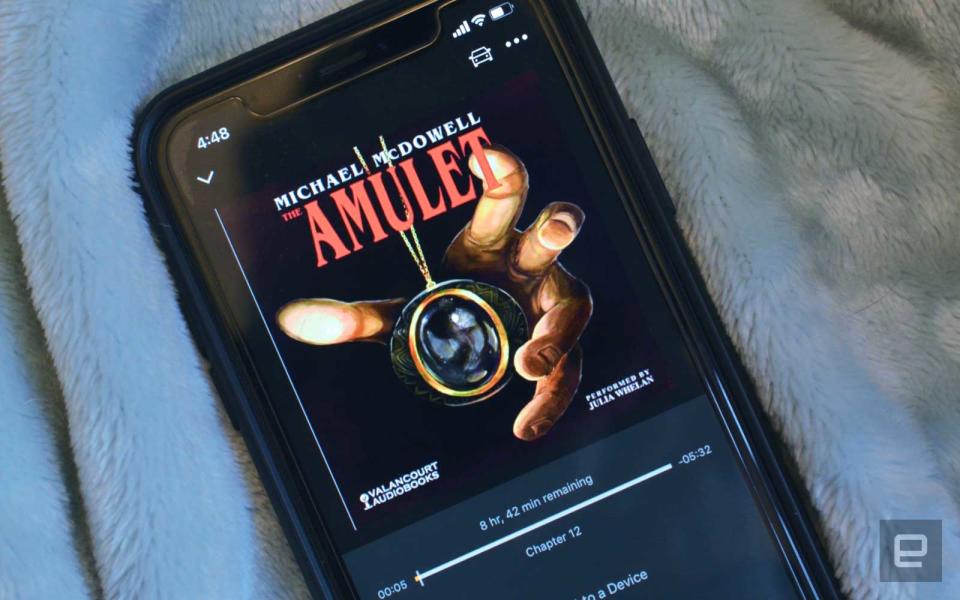What we're listening to: 'The Amulet' and Lewis Capaldi
A murder mystery audiobook and some inspiring soul tunes.
Sometimes, you need good tunes to keep you company. Other times, you just want to listen to a good book. Commerce Editor Valentina Palladino explains why Michael McDowell’s The Amulet is a murder mystery that’s worth your time on Audible. Reviews Editor Cherlynn Low has a breakthrough via the tunes of Louis Capaldi.
The Amulet

Horror fans will get a kick out of Michael McDowell’s The Amulet, a Southern Gothic novel about a mysterious piece of jewelry that wreaks havoc on a small Alabama town. The year is 1965 and Dean Howell suffers a devastating injury in an Army rifle accident. He’s left in a vegetative state, forcing his wife, Sarah, to take care of him while they both live with Dean’s mother, Jo.
A bitter Jo blames the entire town of Pine Cone, Alabama, for her son’s misfortune, and she gives the man she believes most responsible a strange amulet. It doesn’t take long for people to start dying in gruesome ways, leaving Pine Cone residents distraught and police befuddled. Sarah believes the amulet has something to do with the horrific deaths plaguing the town. With help from her friend Becca, Sarah tries to track down the amulet herself in hopes she can stop the bloodshed, once and for all.
Michael McDowell published The Amulet in 1979 as his first novel, and there is a bit of “first book syndrome” here with a slightly repetitive structure and a few introductory dialogue-devoid chapters that set the ambience of Pine Cone. And yet The Amulet is super fun, in a slasher-flick kind of way. Julia Whelan excellently narrates this novel with distinct voices for every character, of which there are many. It’s impressive to hear her switch on a dime from the bitter, contemptuous Jo to the caring, slightly nervous, mustering-all-her-strength Sarah.
McDowell’s horror comes from many sources, the most obvious being his extremely detailed, gasp-inducing death scenes, and the most subtle (and arguably more satisfying) being his rich characters and the interpersonal relationships he creates. McDowell proves in The Amulet (and in many of his other works, namely the Blackwater saga — highly recommend) that monsters live among us and are often those closest to us.
— Valentina Palladino, Commerce Editor
Lewis Capaldi — Divinely Uninspired to a Hellish Extent
Ever since my teens, I’ve been trying to understand what it means to be emotive when singing a song. My formal music education had always been grounded in mastering techniques and theory, and I’ve never had an issue with hitting all the right notes or sight singing accurately. But I started to hear the same feedback over and over again — “You need to make it more personal rather than perfect.”
Various music teachers, vocal instructors and even YouTube commenters told me they wanted more emotional oomph in my performances, and I struggled to deliver. Only after a breakthrough session with my voice coach last year did I see the light.
It’s been hard to explain to my other singer-wannabe friends the difference between a technically perfect yet emotionally lacking rendition of a song compared to a raw, vulnerable performance.
But then I heard Lewis Capaldi’s “Someone You Loved.” After a couple of pretty typical verses and choruses, Capaldi launches into the bridge with abandon, singing with an angry sadness that conveys the strength of his feelings. He practically yells as the melody swells towards the belty high notes. His voice slips into a gritty, hoarse quality that sounds almost like it’s cracking from the effort of singing through his grief.
That coarse texture to Capaldi’s voice is what I’ve come to think of as his signature sound. I used to think of vocal perfection as something to strive for, and this grittiness is technically an imperfection. Many voice coaches will caution against roaring like this as it’s believed to hurt your vocal cords. But it’s an authentic performance, setting Capaldi apart from the sea of artists with smooth silky voices and is ultimately beautiful.
In 2002, a Singaporean construction worker-turned recording artist named A-do launched his debut album. He made waves with the haunting quality of his hoarse voice, which is similar to Capaldi’s (though it doesn’t have the same punch). When Jay Chou burst on to the scene with his first and second albums in the early 2000s, people made fun of how he mumbled his way through the lyrics, yet all the while adulating his songs. Perfection is nice and all, but the world clearly loves uniqueness and authenticity.
Capaldi’s debut album Divinely Uninspired to a Hellish Extent features mostly ballads that allow him to flex his ample vocal muscles. They’re lightly produced, usually accompanied by a simple piano track. If you want to get a sense of just how raw his performances can get, I recommend listening to the Live from the Capitol Rooftop versions of “Someone You Loved” and “Before You Go.” Capaldi also killed a cover of Billie Eillish’s “When the Party’s Over,” nailing that technically challenging song with his vast range but also bringing his signature emotional authenticity to it.
I remember tearing up when I saw Wicked for the first time. Elphaba had just belted her final high note in “Defying Gravity,” and the curtains had fallen for intermission. I couldn’t understand why that performance moved me so. Looking back, I now realize that a powerful song, delivered with genuine emotions, can make us listeners feel things. Like other forms of art, music transports people, and the best artists can use their work to touch your heart. Capaldi’s music can make you cry, if you let it.
— Cherlynn Low, Reviews Editor

